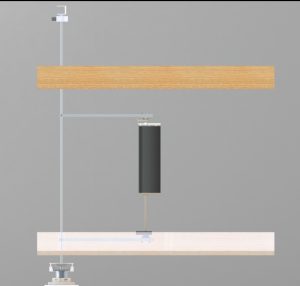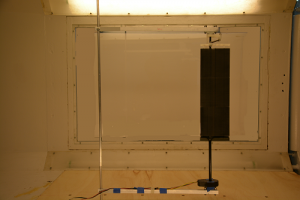Wake mediated coupling of oscillating wing energy harvesters
Research motivation:
Traditional wind turbines are hindered when they are placed in the wake of another turbine. This detrimental effect causes wind turbines to be use up a lot of land space to reduce the amount of wake interactions. Recently a new type of aero/hydro turbine has been explored to offset some of the disadvantages of traditional wind turbines.
Some of the distinct advantages that oscillating wing energy harvesters have over traditional wind turbines is that have a rectangular swept area which makes them applicable in shallow water sites, and the oscillating motion eliminates the high tip speeds associated with wind turbines. Another beneficial effect of oscillating wing devices is that wakes from upstream devices can enhance the performance of a downstream device.
Research abstract:
The project is experimentally investigating the coupling effects from wakes in arrays of aeroelastic oscillating wing devices using the NCSU Subsonic Wind Tunnel. Two aeroelastic energy harvesting devices are used in conjunction with PIV flow quantification to explore the underlying fluid structure interaction phenomena. By varying turbulence levels, Reynolds numbers, and structural parameters a plethora of fluid structure interaction problems can be investigated.
Publications:
- Kirschmeier, B., and Bryant, M., “Toward efficient aeroelastic energy harvesting through limit cycle shaping.” Proc. SPIE Conference on Smart Structures and Materials: Active and Passive Smart Structures and Integrated Systems, April 15, Las Vegas, NV, 2016.
- Kirschmeier, B., and Bryant, M., “Experimental investigation of wake-induced aeroelastic limit cycle oscillatinos in tandem wings,” Journal of Fluids and Structures, Vol. 81, p 309-324, Aug 2018.
- Gianikos, Z. N., Kirschmeier, B., and Bryant, M., “Limit Cycle Characterization of an Aeroelastic Airfoil in the Wake of an Upstream Bluff Body”, 2018 Applied Aerodynamics Conference, AIAA AVIATION Forum, (AIAA 2018-3485)
Current researchers:
Previoius researchers:
